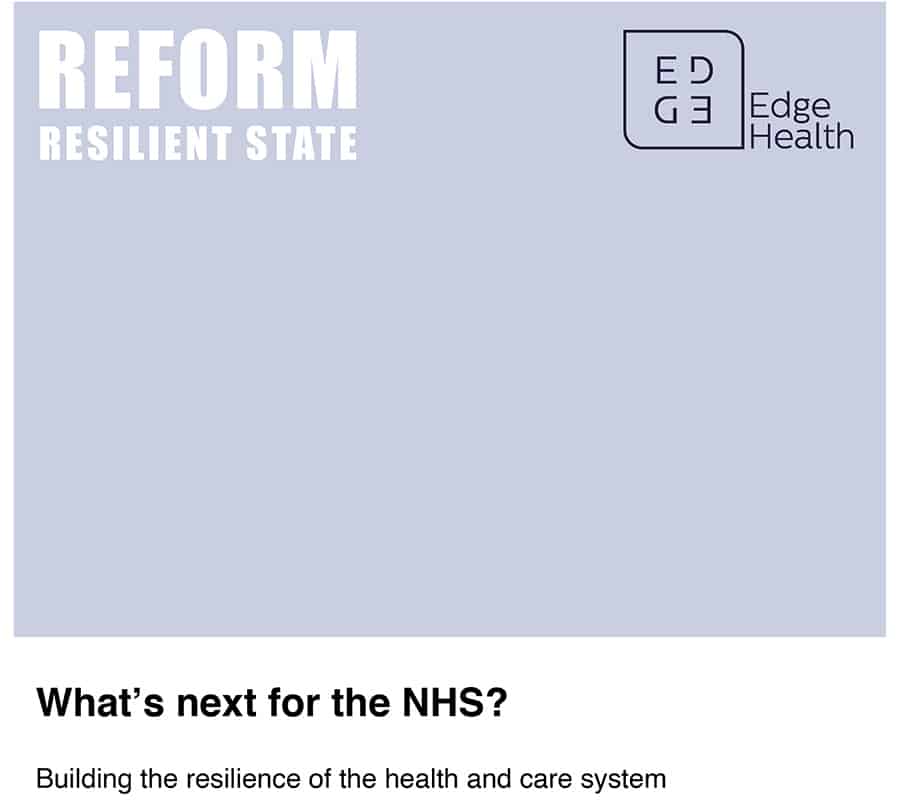One in six could be on an NHS waitlist by April, thinktank suggests

Despite the heroic efforts of healthcare leaders and frontline workers, a lack of system resilience forced the NHS to become a National COVID Service, a new report from by independent thinktank Reform and analytics and insights firm Edge Health indicates.
According to the report – ‘What’s next for the NHS? Building the resilience of the health and care system’ – waiting lists could hit 10 million by April, equivalent to one in six in England.
By April, the number of people waiting a year or more for care is expected to have risen 12,008 percent since the start of the pandemic in March 2020. The report also says by December, the latest month for which there is data, it had already risen by 7,139 percent.
5,948,000 fewer referrals to treatment were made in 2020 compared to 2019 as the pandemic took hold.
The projections are based on the proportion of ‘missing’ activity that returns over the next few months and assuming lower NHS productivity due to infection control measures. This missing activity corresponds to the difference between the number of referrals in 2019 and those in 2020.
Additionally, the projections assume that there is a gradual return to normal levels of referrals by GPs by March 2021 and assumes gradual return to normal treatment volumes considering COVID-19 safety measures by March 2021.
Now, waiting lists are estimated to hit 10 million by April, as referrals for non-COVID begin to restart whilst pandemic pressure and infection prevention measures still limit NHS capacity.
George Batchelor, Director of Edge Health, said: “The ferocity of the pandemic was met with tremendous bravery but came at a cost to normal NHS services, which in many areas were struggling before the pandemic. The full scale of this cost has not yet been seen, but the backlog is already ballooning and will get much worse in coming months.
“The short-term recovery of NHS staff will jar with the need to manage the backlog. But perhaps a bigger challenge will be how to balance the recovery while also building greater long-term resilience and preparedness for the future.”
To help tackle these potential backlog issues and reduce waiting list times, as well as look at the future of the NHSA, the paper makes nine helpful recommendations for the UK Government and key policymakers to consider, which are as follows:
- NHS England and Improvement should mandate the publication of waitlist recovery plans by integrated care systems (ICSs) and trusts. These should clearly state how independent sector capacity will be used and usage data should be published at regular intervals.
- NHS England and Improvement should devote resources to building ‘community diagnostic hubs’ to meet the diagnostic backlog outside of the hospital setting.
- The General Medical Council should create an ‘NHS reserve list’ with healthcare professionals who are not currently working in the NHS but would be willing to re-join to respond to a crisis. A training programme should be developed in collaboration with Health Education England, with clear guidance on the content and frequency of training for members of the reserve list.
- Health Education England should overhaul the way it provides training during a crisis. It should seek to provide training modules that present easily and quickly digestible information.
- The government should provide funding for NHS England and the social care system to increase the number of beds. This should be based on a clear independent review of bed capacity in the health and care system focused on increasing its long-term resilience. The review should focus on understanding how many extra beds the NHS needs, what type of beds and a clear plan to improve patient flow and reduce any delays to patients being transferred or discharged.
- The Department of Health and Social Care, in conjunction with NHS Supply Chain, should produce end-to-end supply chain maps for critical diagnostic equipment and make them publicly available.
- The Department of Health and Social Care should build and publish a register of firms capable of switching their production lines to produce diagnostic equipment and perform diagnostic analysis in the case of health emergencies.
- The Department of Health and Social Care should continue to develop and maintain an up-to-date inventory of key assets, including personal protective equipment and ventilators.
- NHS England and Improvement and NHSX should mandate the adoption of the Scan4Safety programme to all NHS Trusts. This will help increase the accuracy of operational data and patient safety.
Reform is an independent, non-party, charitable thinktank whose mission is to set out ideas that will improve public services for all and deliver value for money.
Edge Health is a specialist firm that provides tailored health data analytics and insights to organisations.

